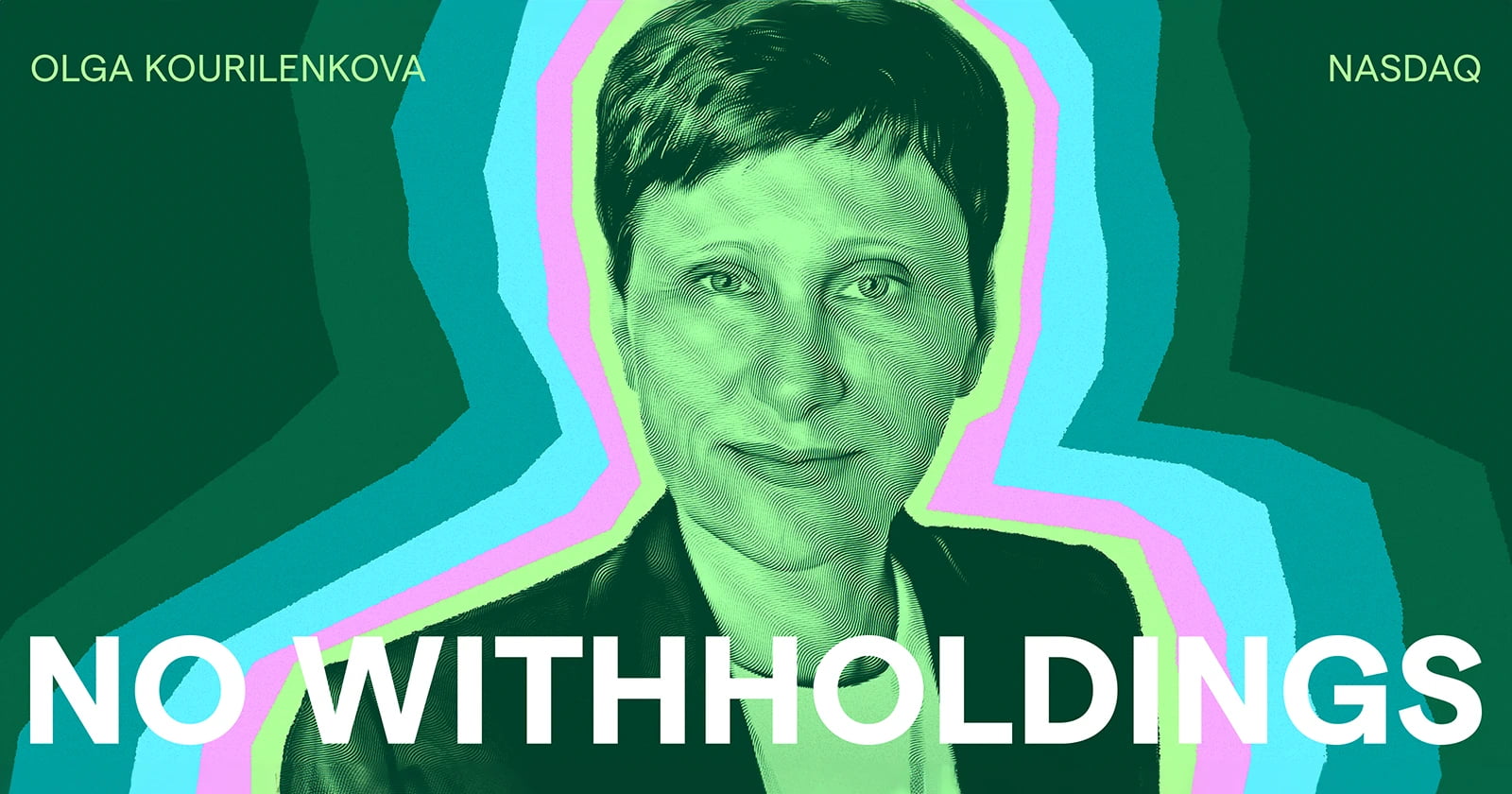{{rich-takeaway}}
In payroll, urgency is part of the job. Deadlines don’t budge, errors compound fast, and pressure comes with the territory.
That’s where Olga Kourilenkova shines.
With over 20 years of experience in payroll, including a decade in the global space, Olga has the calm of someone who’s seen it all — probably because she has. She’s led payroll operations for multinational organizations, supported headcounts in the thousands, centralized global processes, and championed automation every step of the way. Today, she’s the director of payroll at Nasdaq (you may have heard of them), overseeing operations, spearheading international implementations, and driving process improvements.
This payroll superstar didn’t come to payroll through a formal plan, but through observation, curiosity, and the kind of careful listening that defines her leadership today. From Belarus to Nasdaq, from paper archives to AI, her story is one of steady growth and constant learning.
We sat down with Olga to discuss her start in payroll, why she’s hopeful about AI, and how she finds joy not just in her work but also outside of it.
How did you get your start in payroll? Was it intentional, accidental, or somewhere in between?
I’d say it was more of an accident. I graduated with a degree in economics, but right after college, I didn’t really know what to do with it. Some people said I should go into research, but I wasn’t interested. At the same time, I was moving (I'm originally from Belarus), and I was looking for any kind of job to get started.
Through a family member, I got a job in a payroll department. But I wasn’t doing payroll right away. My first assignment was to digitize their paper archives. This was a long time ago, when companies were just starting to move from paper to digital. Through that experience, I got to know the teams and the people really well.
Payroll gives you a real sense of accomplishment. Not just payday, every day.
It wasn’t until a few years later that I actually joined the payroll department. And because I had gotten to know the people first, it felt a little different. I was very serious, very dedicated. And I didn’t want to let anyone down.
And one interesting thing: For the first three months, I wasn’t allowed to touch production. I could only take notes, observe, and learn. So when I finally got to start doing payroll, I was so excited. Like, “Yes! I can finally do something!” So it wasn’t love at first sight, but once I got into it, I really liked it.
You’ve come a long way. When people find out you run payroll at Nasdaq, what’s their reaction?
I’m actually pretty shy, so I try not to mention it. But when people find out, it’s a jaw-dropping moment. Like if someone says they work at Facebook or Google. It’s that kind of reaction.
My husband loves to tell people. He’s very proud. My whole family is. And I’m proud too, of course. Nasdaq is a big name. And it comes with big responsibility. But I’ve worked with great people at great companies throughout my career, and I love my team at Nasdaq.
I love that. We talk a lot about “meaningful work” here at Lattice — where do you find meaning?
The second part is all the little things — projects, problems, tasks. Payroll isn’t boring. It’s very eventful. Every day, something new happens. There are new challenges, new situations, and you’re constantly in this problem-solving mode. Payroll gives you a real sense of accomplishment. Not just payday, every day.

Payroll is high stakes. When things do go wrong, how do you handle that pressure? Any advice?
First, I’m a big believer in being proactive. That means having strong controls in place. I always tell my team: Payroll is not the job for typos. You have to double-check, triple-check — however many times it takes to get it correct.
That way, if someone comes to you with a problem, your first thought is, “Okay, let’s figure this out,” not panic. That gives you internal peace.
But of course, mistakes happen. We’re human. I always take a pro-employee approach. I’ve worked under HR, and I believe in listening first. Try to really understand what the person is going through. Sometimes we can fix things easily. Sometimes we can’t. But either way, I always try to give options. I don’t like just saying no. I’ll say, “Okay, we can’t do X, but maybe we can do Y. Would that help?”
And if it’s a bigger issue or escalation, communication is key. You need to keep leadership and any impacted teams informed. And always learn from it. Build a better process so it doesn’t happen again.
What brings you joy in payroll?
I think the joy comes from working with a great team. I’ve worked alone before, and it’s just not the same. When you’re with other payroll professionals who understand you, who know the stress, who know the language, it makes a big difference.
I think payroll leaders need to manage up, not just manage their team.
You can vent together, share stories, and socialize. That’s what makes it fun. That connection with the team is probably what brings me the most joy.
Payroll is critical, but often underappreciated. Do you ever feel undervalued?
I’ve been really lucky — I’ve always had good managers, and I’ve never really felt undervalued. Also, I value myself a lot, so it’s hard to shake that!
But payroll isn’t well understood in general, and it can be undervalued. That’s why I think payroll leaders need to manage up, not just manage their team. You have to talk about your work, share metrics, and explain why your team is busy. If you don’t, people won’t know.
Celebrate your wins. Like, after annual bonuses go out — take a moment and say, “Hey, we did that. On time. Accurately.” Create that recognition for your team and your function.
What’s frustrating you right now?
Right now, we’re going through a lot of change, but I wouldn’t say it’s frustrating. That’s just part of life in global payroll. Things always change.
What does frustrate me is payroll technology. Some of the tools we use are just so behind. It’s like, come on. Let’s catch up to the 21st century already! The industry is very conservative. People don’t like changing systems that work, but I’m a change agent. I want to see more innovation.
It’s hard to automate payroll with simple tools, but AI could be different. It has huge potential.
That leads perfectly into my next question. How do you feel about AI?
I’m super excited. But I haven’t seen much yet, and that’s frustrating. We keep hearing about AI, and we’re seeing it in other areas — but not really in payroll yet.
And payroll is perfect for it. It’s repetitive but complicated. It’s hard to automate payroll with simple tools, but AI could be different. It has huge potential. But it takes investment, and our vendors need to prioritize it. So I hope they do.
Is there anything else you’d like to tell those vendors?
Vendors, please talk to us. Not just to company leadership, but to the people actually using your software — managers, specialists, everyone. We know what works and what doesn’t. We know what’s missing. And sometimes the design changes you roll out? They drive us nuts. So please: Talk to us.

Amen. What advice would you give someone just starting out in payroll?
I love this question. First, payroll is complicated. And there are many directions you can go. You can do operations, compliance, accounting, systems — lots of options. So at the beginning, just focus on doing your current job well. Then start thinking about what you enjoy, and build in that direction.
Don’t just wait for someone to hand you growth. Make yourself marketable. Keep learning.
Next, volunteer for projects, ask for tasks, and if nothing is available, take a course. Learn something new. Talk to senior people. Get a mentor. Keep building your skills.
Most of all, actively manage your career. Don’t just wait for someone to hand you growth. Make yourself marketable. Keep learning. And if you ever feel stuck, remember: Even within payroll, there are always other paths.
Our platform is yours. Anything else you’d like to share?
To payroll professionals: This job is stressful. You work long hours, it’s deadline-driven. So take care of yourself. Find hobbies. Spend time with people you love. Make space for life outside of work.
To employees: Behind that line on your bank statement is a whole team of professionals doing their best. We don’t want to mess up your money. So if something does go wrong, please treat us with the respect you’d want if the roles were reversed.
Lastly, to companies: Payroll doesn’t bring in revenue, but it is a big part of the employee experience. If pay is wrong or delayed, people are unhappy. Keep investing in payroll, and give employees the support and tools they need.
{{rich-highlight-2}}

💬 Join the Resources for Humans community.
To connect with other HR and payroll leaders, sign up for our 23,000+ strong Slack community, Resources for Humans.
Payroll deserves its place at center stage. No Withholdings celebrates payroll’s unsung heroes and gives them a platform to speak their minds. So listen up — and come payday, give thanks. 💚




.webp)



